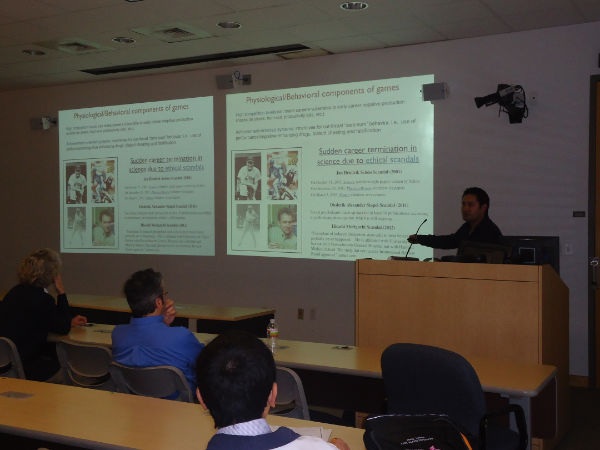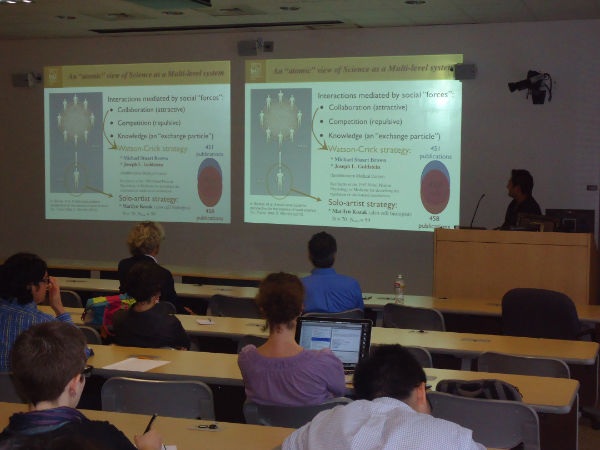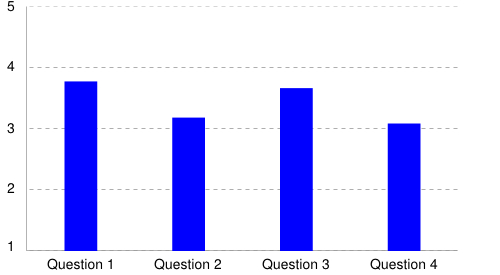Seminars and Panels
|
Identifying potential pitfalls in the quantitative appraisal system for scientific careers
Professor Alexander M. Petersen
|
Dec 3, 2012 |

Quantitative measures are becoming increasingly prevalent in the scientific appraisal of countries, universities, departments, and notably, individuals. In this talk I will discuss the potential pitfalls arising from the appraisal of individual careers based on citation metrics, a proceeding which is likely to occur at several stages of an academic career, from postdoctoral and faculty appointments to career achievement awards. Using longitudinal career data for 450 scientists, ranging from assistant professors to Nobel laureates and Fields medal winners, I will demonstrate a graphically intuitive method for visualizing an individual's publication profile. While much ado has been made about the h-index, a metric intended to measure simultaneously the productivity and impact of a scientist, I will argue for the careful use of this and related quantitative measures. With the remaining time, I will illustrate the complex dichotomy of competition and collaboration in science.
Click here to view the presentation. |
Click here to view the webcast. |
||
About Professor Alexander Petersen
I am currently an assistant professor at the IMT Institute for Advanced Studies Lucca as a member of the Economics and Institutional Change division. Before joining the IMT Lucca, I spent my doctoral years at Boston University where I received a PhD in Physics using concepts and methods from statistical physics to quantify dynamic phenomena in the social and economic sciences. I am currently involved in analyzing "big data" comprising (i) high-frequency Trades and Quotes (TAQ) financial data, (ii) Google n-gram language data, and (iii) measures for longevity, success, productivity and innovation in science and also generalizing the findings to professional sports. In the broadest sense, I search for statistical regularities in empirical data, which can be used to better understand patterns of growth in diverse complex systems.


Audience Feedback |
n = 32 |

Question 1 - How interesting was the topic to you?
Question 2 - How relevant was the topic to your interest and field of research?
Question 3 - How would you rate the quality of the presentation?
Question 4 - How would you rate the quality of the audience's interaction with the speaker?
- 2017 - 2018
- 2016 - 2017
- Behavioral Concepts and the Sciences of Human Behavior
H. Longino Apr 21, 2017 - Insane Asylums and Genetics: How Human Heredity Became a Data Science
T. Porter Feb 17, 2017 - The Nature of Pride: The Emotional Origins of Social Rank
J. Tracy Jan 23, 2017
- Behavioral Concepts and the Sciences of Human Behavior
- 2015 - 2016
-
Public Ethics, Politics and Sociobiology
M. P. Sheldon Mar 11, 2016 -
Classifying People by Color: How Racial Categories Change Over Time
A. A. Martinez Feb 29, 2016 -
The Origin of Social Impulse: E.O. Wilson's Recent and Controversial Rejection of Kin Selection in Historical Context
A. Gibson Dec 4, 2015
-
Public Ethics, Politics and Sociobiology
- 2014 - 2015
-
Special Event: Lone Star History of Science Meeting Writing the Origin with Burned Fingers: Darwin's Penance for the "Sin of Speculation"A. Sponsel Apr 3, 2015 - Welfare, Work, and Witness: Why Clinical Research Can Survive the Death of a Healthy Human Subject
L. Stark Apr 3, 2015 - The Distinctive Significance of Systemic Risk
A. James Mar 6, 2015 - The Devil's Heritage: Masuo Kodani, the "Nisei Problem," and Social Stratification at the Atomic Bomb Casualty Commission in Japan (1946-1954)
V.B. Smocovitis Jan 28, 2015 - Atypical Combinations and Scientific Impact
B. Uzzi Dec 8, 2014 - Psychology of Science and Technology
M. Gorman Nov 17, 2014 - How Economics Shapes Science
P. Stephan Sep 10, 2014
-
- 2013 - 2014
- The Decision to Put David Vetter in the Bubble
J. H. Jones Apr 16, 2014 - Ethical Paradoxes of
Control: Science, Engineering, and the Expansion of Moral ResponsibilityR. Hollander Mar 3, 2014 - 'Broken Symmetry': Humanism, Militarism, and the Dilemmas of Scientific Identity in Nuclear Age America.
J. Wang Feb 17, 2014 - Using Creative Non-Fiction in Teaching Research Ethics
C.M. Klugman Dec 2, 2013 - Does Neuroscience Undermine Responsibility?
W. Sinnott-Armstrong Nov 15, 2013 - Arming Mother Nature: The Birth of Catastrophic Environmentalism
J. Hamblin Oct 18, 2013
- The Decision to Put David Vetter in the Bubble
- 2012 - 2013
- Lead Wars: the Politics of Science and the Fate of America's Children
D. Rosner Mar 25, 2013 - Identifying potential pitfalls in the quantitative appraisal system for scientific careers
A.M. Petersen Dec 3, 2012 - Keeping Secrets: Scientists' strategic management of militarization, 1945-1980
S. Lindee Nov 12, 2012 - Evolutionary Theory as Methodological Anesthesia: Methodological and Philosophical Lessons from Evolutionary Psychology
R.N. Boyd Oct 19, 2012 - Panel on Peer-Review Issues
Oct 11, 2012
- Can technology enable cities to cope with the economic winter?
A. Hampapur Sep 21, 2012
- Lead Wars: the Politics of Science and the Fate of America's Children
- 2011 - 2012
- Engineering Success and Failure on 9/11
S.K.A. Pfatteicher Apr 27, 2012 - Regulating Ionizing Radiation: Flawed Standard, Flawed Ethics
K.S. Frechette Mar 5, 2012 - Do fish feel pain?
C. Allen Jan 25, 2012 - The Ethics of Relevancy
J. Levine Dec 13, 2011 - ORI Cases and How to Protect Yourself from Research Misconduct in Your Labratory
A.R. Price Nov 7, 2011
- Engineering Success and Failure on 9/11











